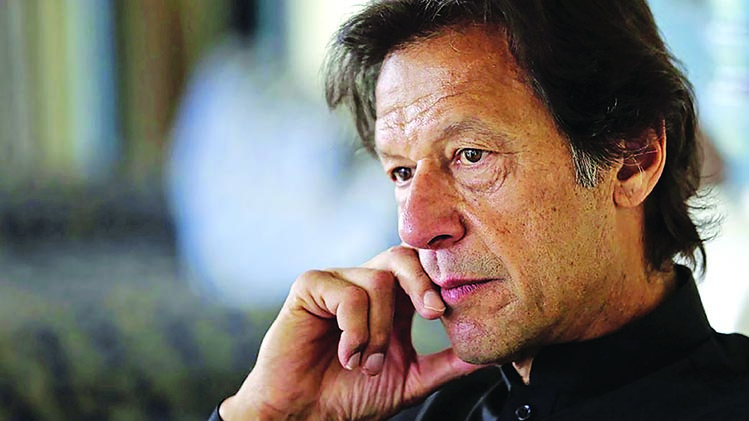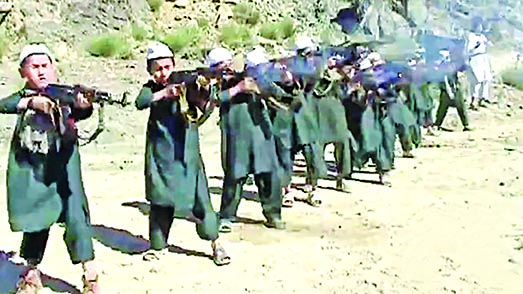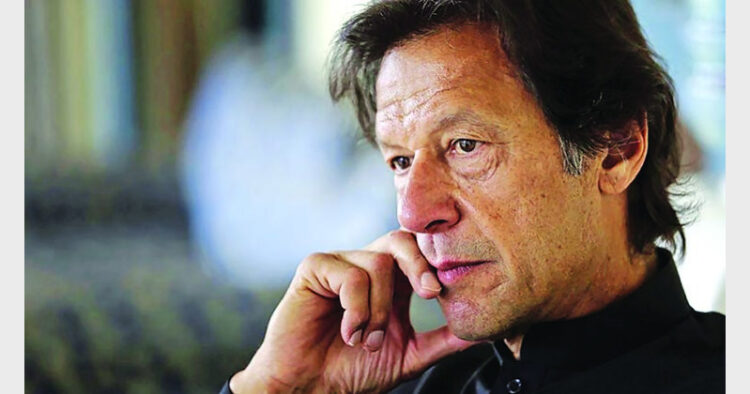Facing an existential threat and under enormous pressure from the international community, Pakistan is clawing at every straw for a dialogue with Bharat, which is not willing, unless Pakistan dismantles its terror factories
Rajan Khanna
Pakistan’s desperation to engage Bharat in peace talks is understandable. Not only Pakistan’s geostrategic reasons are compelling Pakistan leadership to restart diplomatic parleys with Bharat but also Pakistan’s crumbling economy is forcing Prime Minister Imran Khan to issue statements after statements for bilateral dialogue between the two countries. In Bishkek, Kyrgyzstan, on the sidelines of SCO Summit, Pakistan tried to use Chinese President Xi Jinping to convince Bharat for bilateral talks but PM Narendra Modi did not budge from his official stand of not having talks with Pakistan until it dismantles its terror infrastructure.

Withdrawal of China’s technical objection to labelling Masood Azhar as an international terrorist was not done without consultation with its protege, Pakistan. International pressure exerted by the Bharatiya government was so enormous on Imran Khan that if Masood Azhar was not declared a terrorist, the next step would have been to declare Pakistan a terrorist state by the comity of nations. Already tottering under unprecedented economic crisis, Pakistan cannot afford economic sanctions. FATF too has kept it on its watch list and any terrorist action by it will push it further to the unenviable economic crisis.
In the worst scenario, if Pakistan uses nuclear bombs against Bharat, it cannot damage more than a small territory of this nation, but, in retaliation, Pakistan will be obliterated from the map of the worldIf we visualise the relations between the two countries in a holistic way, we discover that the Bharatiya airstrike at Balakot terrorist training camp in Pakistan was not just a retaliatory step against the dastardly killings of the CRPF personnel in Pulwama district of Jammu & Kashmir by Pak based Jaish-e-Mohammed. It was a paradigm shift in Bharatiya policy of dealing with terrorist acts sponsored by Pakistan. If we analyse the security situation prevailing in the Bharatiya subcontinent ever since the creation of Pakistan, that country has been trying to snatch the territory of Jammu & Kashmir by hook or by crook, which it could employ. It sent its armed forces personnel under the garb of Kabailis in 1947, repeated the act named as operation Gibraltar in 1965 followed by full-fledged war. However, with decisive defeat and breaking of that country, in 1971, it changed its policy towards Bharat. Pakistan devised a two-pronged strategy to implement its agenda of breaking Bharat. Its infamous spy agency, ISI, started training and arming terror outfits to foment trouble in Bharatiya states of Punjab, Jammu & Kashmir, in particular, and other states, in general. On the other hand, it created a nuclear bluff to threaten Bharat intermittently; whenever there was the talk of giving a fitting response to Pakistani terrorist activities, the generals and their puppet civilian rulers of that country would give statements that the nuclear arsenal has not been kept to be used in Shab-e-Baraat.

Kids filmed firing heavy arsenal at a terror training Camp in Pakistan
Unfortunately, our erstwhile political leadership couldn’t give a befitting reply to their hollow threats. Today, that paradigm of Pakistan masterminding terrorist strikes on the land of Bharat and pre-empting the Bharatiya response with threats of using nuclear arsenal stands exposed forever. When the package of Bharatiya airforce planes crossed LoC and bombed terrorist hub of Balakot, message was delivered loud and clear to Pakistan in particular and the rest of the world in general: the days are over when the blood of the sons of this country was spilled now and then; henceforth the response will be of unimaginable magnitude. PM Modi, in unambiguous terms, addressed Pakistan that even our nuclear weapons have not been kept to be used as crackers on Diwali. In all practical terms, the Rubicon had been crossed.
In future too, if at all Pakistan’s sincerity towards winding up its terrorist agenda is demonstrated, Bharat should talk only on the issue of getting back its territories which have been illegally occupied by the formerBefore this, incessant nuclear threats from across the border had not been dealt with appropriately. In the worst scenario, if Pakistan uses nuclear bombs against Bharat, it cannot damage more than a small territory of this nation, but, in retaliation, Pakistan will be obliterated from the map of the world. There is another highly potent angle also attached to the nuclear matrix between the two countries; for inexplicable reasons, it has been ignored by the experts who are writing and delivering lectures on this subject. Pakistan is a proclaimed Islamic state and in Islam, if somebody dies by burning or his body is burnt even after dying, doors of Phirdaus (Paradise) are shut on him and he has essentially to go to Jahannum (Hell). Radioactivity emitted by an atom bomb causes severe injuries resulting in mass deaths; Mullas should be ready to persuade the Jihadi gangs to forget 72 Huris in paradise and to prepare for ever-engulfing fires of Jahannum.
Conversely, in Hindu philosophy, life and death are the outcomes of one’s Karma; performance of Rashtra Dharma is one of the ways of attainment of Moksha. Therefore, once and for all, Pakistani zealots should stop the rants of nuclear blackmail. Pakistan is not likely to roll back its terrorist infrastructure. It is irreversible because it will be contrary to the long term strategic interests of that country. From a Pakistani perspective, covert warfare is the best tool when it plans to meddle in Bharatiya affairs; it needs jihadi groups to gain so-called strategic depth in Afghanistan also. On cost benefit analysis too, creating and maintaining these ultras come at almost no cost to that country. It just has to provide political support and rest everything is taken care of by the groups themselves.
Ideological training is provided in the religious seminaries which are funded by raising donations from the public. One example can be given in this regard; after Bakrid, people usually donate the hides of the sacrificed animals and in most cases, the Jihadi Tanzeems are the beneficiaries. Realistically, billions of Pakistani rupees are raised by the said Tanzeems, needless to say, the funds are channelled into training camps and to buy arms. In the context of Jammu & Kashmir also, to support secessionism, Pakistan needs those youth who are desirous of going to Jannat-e-Phirdaus and are ready to sacrifice their lives for their supposedly holy cause. Finding of Fidayeen from within the state of Jammu & Kashmir is going to be increasingly difficult for the ISI of Pakistan because of the no-nonsense policy of the Bharatiya Government in respect of the said state. Saraiki speaking Southern areas of Pakistani Punjab, namely Multan and Jhang are flush with seminaries, which are imparting religious training to the Talibs. These areas, historically, have been an ideal hunting ground for the Jihadi Tanzeems as well as the ISI. Unless there is a conscientious check on these Tanzeems, thoughts of reining in terrorist outfits, are like living in a fool’s paradise. All steps taken by the Pakistani government to show to the world that it is winding up its terrorist infrastructure are factually cosmetic in nature. By confining likes of Maulana Masood Azhar and Hafiz Sayeed to indoor comforts of so-called house arrest, Pakistan cannot hogwash the international community. Even starters in the field of international diplomacy know that Pakistan is in dire straits as far as its economy is concerned and needs IMF funds. Obviously, it has to portray its clean image to the rest of the world and present itself as a country rolling back its terrorism-sponsoring agenda. Given Pakistan’s strategic over-reliance on Jihadi terrorism, Bharat should continue with the policy of no-talks with that country until tangible results, of winding up of infrastructure of terrorism, are visible. Bharatiya diplomats have left no stone unturned, in the past few years, to isolate Pakistan on the front of terrorism internationally. Today, any talks, on how so ever small level will negate the diplomatic benefits collected by Bharatiya diplomacy. It should be understood that Pakistan has always tried to discuss only Kashmir whenever bilateral talks have taken place between the two countries in the past.
When the state of Jammu & Kashmir is an integral part of this country then what is the basis of discussing it time and again with Pakistan? Bharatiya Parliament had passed a unanimous resolution in 1994 to take back all the territories of the state of Jammu & Kashmir, which are under the illegal occupation of Pakistan. In future too, if at all Pakistan’s sincerity, towards winding up its terrorist agenda is demonstrated, Bharat should talk only on the issue of getting back its territories which have been illegally occupied by the former. Pakistan has started ceding certain parts of Gilgit to China. Shamsgam Valley is already under Chinese occupation; China-Pakistan Economic Corridor is passing through Pakistan occupied territories of Gilgit, Hunza and Baltistan. China has stationed thousands of troops in the area. All these matters should appear on the agenda whenever talks between the two countries become indispensable.














Comments